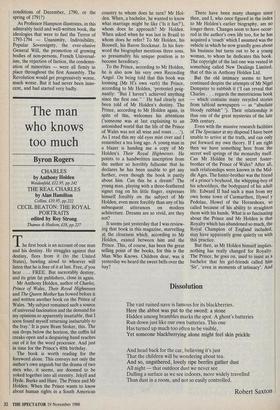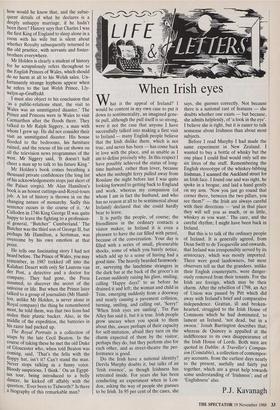The man who knows too much
Byron Rogers
CHARLES by Anthony Holden
Weidenfeld, f12.95, pp.242
THE REAL CHARLES by Alan Hamilton
Collins, £10.95, pp.222
CECIL BEATON: THE ROYAL PORTRAITS edited by Roy Strong
Thames & Hudson, £18, pp.227
The first book is an account of one man and his destiny. He struggles against that destiny, flees from it (to the United States), bawling aloud to whoever will listen that he is free of it at last. Free, d'you hear . . . FREE. But inexorably destiny, and its grim fat publishers, close in again.
Mr Anthony Holden, author of Charles, Prince of Wales, Their Royal Highnesses and The Queen Mother has bowed before it and written another book on the Prince of Wales. 'My subject remained such a source of universal fascination and the demand for my opinions so apparently insatiable, that I soon found myself returning ineluctably to the fray.' It is pure Bram Stoker, this. The sun drops below the horizon, the coffin lid creaks open and a despairing hand reaches out of it for the word processor. And just in time for the Prince's 40th birthday.
The book is worth reading for the foreword alone. This conveys not only the author's own anguish but the drama of two men who, it seems, are doomed to be yoked together into all eternity. Jekyll and Hyde. Burke and Hare. The Prince and Mr Holden. When the Prince wants to know about human rights in a South American country to whom does he turn? Mr Hol- den. When, a bachelor, he wanted to know what marriage might be like (`Is it fun?'), whom does he approach? Mr Holden. When asked when he was last in Brazil to whom does he refer? To Mr Holden, his Boswell, his Baron Stockmar. In his fore- word the biographer mentions three sons, so presumably his unique position is to become hereditary.
To the Prince, according to Mr Holden, he is also now his very own Recording Angel. On being told that this book was looming (Mr H's own verb) the Prince, according to Mr Holden, 'protested poig- nantly: "But I haven't achieved anything since the first one." ' He had clearly not been told of Mr Holden's destiny. The Prince, according to Mr Holden again, in spite of this, welcomes his attentions (`someone was at last explaining to an astonished world that the life of the Prince of Wales was not all wine and roses . . .'). As I read this my old eyes mist over and I remember a tea long ago. A young man in a blazer is handing me a copy of Mr Holden's Their Royal Highnesses. He points to a handwritten inscription from the author so horribly fullsome that he declares he has been unable to get any further, even though the book is partly about him. Can this be a dream? The young man, playing with a three-feathered signet ring on his little finger, expresses himself forcibly on the subject of Mr Holden, even more forcibly than any of his subsequent utterances on modern achitecture. Dreams are so vivid, are they not?
It seems just yesterday that I was review- ing that book in this magazine, marvelling at the closeness which, according to Mr Holden, existed between him and the Prince. This, of course, has been the great selling point of the books, for this is the Man Who Knows. Children dear, was it yesterday we heard the sweet bells over the bay? There have been many changes since then, and I, who once figured in the index to Mr Holden's earlier biography, am no longer there. Changes seem to have occur- red in the author's own life too, for he has acquired a 'coach' which I assumed was the vehicle in which he now grandly goes about his business but turns out to be a young woman, to whom he dedicates this book. The copyright of the last one was vested in something called New Dealings Limited, that of this in Anthony Holden Ltd.
But the old intimacy seems to have continued despite the attempts of Mr Nigel Dempster to rubbish it CI can reveal that Charles . . . regards the meretricious book — which contains many recycled stories from tabloid newspapers — as "absolute bloody rubbish" '). Their relationship is thus one of the great mysteries of the late 20th century.
Even with the massive research facilities of The Spectator at my disposal I have been unable to arrive at the truth, and can only put forward my own theory. If I am right then we have something here from the secret well springs of the monarchy itself. Can Mr Holden be the secret foster- brother of the Prince of Wales? After all, such relationships were known in the Mid- dle Ages. The foster-brother was the friend of a prince's boyhood, the whipping-boy of his schooldays, the bodyguard of his adult life. Edward II had such a man from my own home town of Carmarthen, Hywel y Pedolau, Howel of the Horseshoes, so called because of his ability to straighten them with his hands. What is so fascinating about the Prince and Mr Holden is that Royalty which has abandoned so much, the Royal Champion of England included, may have apparently gone quietly on with this practice.
But then, as Mr Holden himself implies, nothing has really changed for Royalty. The Prince, he goes on, used to insist as a bachelor that his girl-friends called him `Sir', 'even in moments of intimacy'. And how would he know that, and the subse- quent details of what he declares is a deeply unhappy marriage, if he hadn't been there? History says that Charles I was the first King of England to sleep alone in a room with his wife but is silent about whether Royalty subsequently returned to the old practice, with servants and foster- brothers everywhere.
Mr Holden is clearly a student of history for he scrupulously refers throughout to the English Princes of Wales, which should do no harm at all to his Welsh sales. Un- fortunately strange hyphens appear when he refers to the last Welsh Prince, Lly- welyn-ap-Gruffydd.
I must also object to his conclusion that `as a public-relations stunt, the visit to Wales was an unmitigated disaster.' The Prince and Princess were in Wales to visit Carmarthen after the floods there. They talked to Mr Ralph Siggery, a man with whom I grew up. He did not consider their visit an unmitigated disaster. His house flooded to the bedrooms, his furniture ruined, and the rescue of his cat shown on all the television news programmes of the west, Mr Siggery said, 'It doesn't half cheer a man up to talk to his future King.' Mr Holden's book comes breathing a thousand private confidences (the long list of his acknowledgements stops just short of the Palace corgis). Mr Alan Hamilton's book is an honest cuttings-and-Royal-tours job. A lot of history is thrown in on the changing nature of monarchy. Sadly this sentence occurs in the course of it. 'At Culloden in 1746 King George II was quite happy to leave the fighting to a profession- al general, "Butcher" Cumberland.' The Butcher was the third son of George II, but Perhaps Mr Hamilton, a Scotsman, was overcome by his own emotion at that point.
He tells one fascinating story I had not heard before. The Prince of Wales, you may remember, in 1987 trekked off into the Kalahari Desert with only Sir Laurens van der Post, a detective and a doctor for company. They had gone, the Press assumed, to discover the secret of the universe or life. But when the Prince later talked to a group of journalists (Mr Hamil- ton, unlike Mr Holden, is never alone in Royal company) the thing he remembered most, he told them, was that two lions had stolen their plastic bucket. Also, in the middle of the expedition, the batteries in his razor had packed up. The Royal Portraits is a collection of snaps by the late Cecil Beaton. In the course of taking these he met the old Duke of Gloucester who, when told Beaton was coming, said, 'That's the fella with the floppy hat, isn't it? Can't stand the man. Never stops talking in a funny voice. Bloody suspicious, I think.' On an Egypt- ian tour, being introduced to a belly dancer, he kicked off affably with the question, 'Ever been to Tidworth?' Is there a biography of this remarkable man?























































 Previous page
Previous page